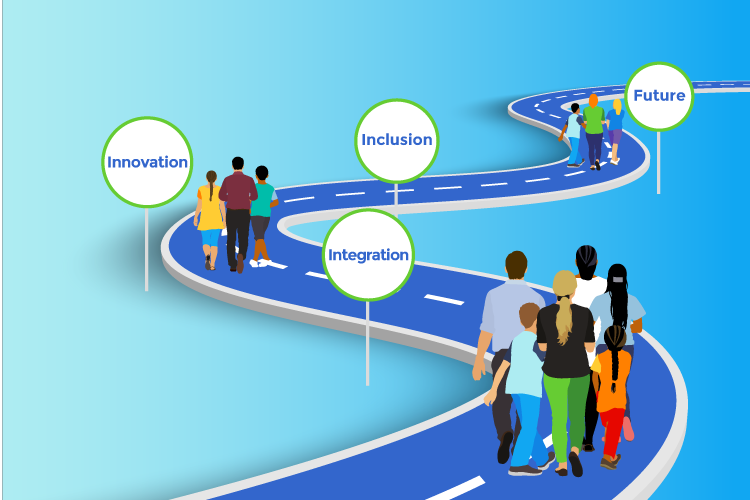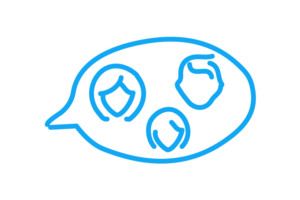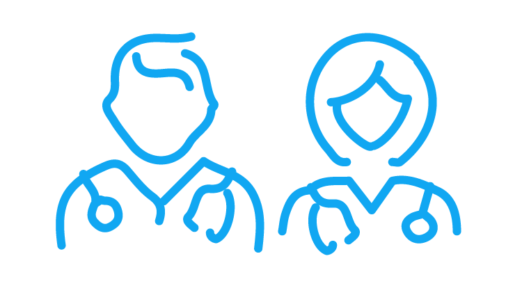Our vision
We introduce what we hope to see in 2040, and what needs to happen in order to make our vision a reality.
"The pandemic has forced us into new ways of working and new ways of thinking. It's clear that as the body that speaks for paediatrics and child health in the UK we need to set out a clear vision for how healthcare could improve in the future for the next generation."
Innovation - in 2040, we hope to see...
1.
An improved landscape for innovation, with increased capacity for research that is specific to innovation and technology in paediatrics
2.
Clinicians moving beyond the digital consultations adopted during the 2020 pandemic and using digital health products to better monitor, care for and treat patients.
3.
Technology used in paediatric settings that is designed or adapted for use specifically with children and young people
4.
Widespread implementation of appropriate guidelines and frameworks that are specific to paediatric care to make technology safe and accessible for all
5.
All relevant stakeholders involved in paediatric care, including children and young people, involved in the design, development and integration of different innovations and health technologies relating to their care
6.
All innovations and technology assessed for accessibility to ensure they will not further isolate underserved populations
7.
A workforce with the expertise to utilise new data technologies with confidence and lead projects to address the needs of those working at the coal face of the NHS.
We have developed an understanding of how innovation and technology will impact the delivery of paediatric services in the future.
Models of care - in 2040, we hope to see...
1.
Life reimagined through the lens of the children and families we care for, exhibiting compassion for their needs and equity of care for all families
2.
A whole population approach to care that builds on six broad patient segments as oppose to stratification by patient pathways
3.
Paediatric models of care that are truly child centred, rather than built to suit existing systems, with communication and adaptation as the key ingredients in any system
4.
Developmentally appropriate care that is easily adaptable to changing biopsychosocial profiles
5.
Care models that take vulnerability into consideration and explore social circumstances in all encounters that include personal and community factors
6.
Reduced clinical variation for single chronic health problems, with every child being seen in the right place at the right time by the right professional through connected care
7.
Enhanced care models for children with long term conditions that focus specifically on improving quality of care and quality of life
8.
More children and families empowered to know when to seek care, with reduced pressure on emergency department attendances
9.
Optimisation of technology to support fully integrated systems across paediatric care, allowing remote monitoring and seamless interconnectivity
10.
Child and family engagement embedded in every paediatric service across the UK
We have developed scenarios for future models of care that ensure the health needs of children and young people are properly served across the UK.
Working Lives - in 2040, we hope to see...
1.
Doctors working remotely with multidisciplinary and global teams to support clinical decisions, sharing their knowledge, guidance and research
2.
Doctors having knowledge and understanding of new medical technology and data interpretation, to benefit and create personalised health care, working in partnership with patients
3.
Stronger links between paediatrics and other specialties, with paediatricians and GPs finding ever closer ways of working together
4.
Increased consideration of the whole child and a focus on making every contact count, for medical and social care, health promotion and teaching and training
5.
Flexible and progressive rotas which allow doctors to deliver high quality patient care, not impeded by excessive workload, allowing for both continuity of care and attention to sleep, as appropriate
6.
Staff wellbeing being at the forefront of institutions, with attention to taking proper breaks to refuel on nice, healthy food, the ability to rest and recharge and initiatives to promote health and balance
7.
All staff feeling like they are part of a cohesive team, with true inclusivity, attention to diversity and modern leadership.
8.
Inclusion of different working models within paediatric teams and inclusion of more varied multidisciplinary team members to support patients
9.
Trainees who are supported to obtain the best career fit, with flexible training options
10.
A paediatric workforce that is involved and influences global health, climate changes and inequality.
We have developed a vision of future workforce requirements and training to ensure we provide the best possible services for children and young people.
Enablers for a brighter future
To set things on course for a better future and to reach our vision, we highlight three ‘enablers’, or areas of focus.

We want to see existing data systems integrated (both within and between trusts/boards), so we don’t have to invent new ones each time, and data collection is routinised.
We want to see more training in paediatrics integrated into the training pathways of other specialities, especially our GP colleagues, with reciprocal opportunities for paediatric training also explored.
We want to see development of integrated care for children and young people (CYP) at scale across the UK. This has the potential to dramatically reduce or even reverse our forecast increases in attendances, reducing strain in the system whilst improving outcomes for family and young people’s experience of care.
We want to see research integrated at all levels of new paediatric care pathways in primary, secondary and tertiary care. COVID-19 has shown the importance of this, but we want to see this for all paediatric research in the future.
We want to see global integration of care to support the best clinical decisions. Technology means that doctors are able to work remotely, sharing knowledge, guidance and research in a multidisciplinary way and we want to see more of this.
We want to see significantly improved integration across physical and mental health, challenging management to enable working across professional and organisational boundaries, to provide the best possible care for children and young people. This is in response to our forecasts of future burden of disease expected in 2040, especially among adolescents.

We want to see a culture of research embedded across paediatrics, ensuring children and young people are prioritised and innovative practice is designed both with them and specifically for them.
We want to see more instances of collaborative, interdisciplinary research focused on paediatrics and child health. We noticed a lack of health economics work relating to child health outcomes, and we think this needs funding and prioritisation.
We want to see everyone contributing in creating an environment that will let innovation flourish. COVID-19 has demonstrated how change can happen in a short space of time, and we want to see that harnessed, with a willingness to adapt and take a patient-centred approach.
We want to see significant innovation and shift in the national approach to addressing the impact of global health issues impacting child health, including poverty and climate change.

We want to see children, young people and families involved in the design, development and integration of different innovations and health technologies. Evidence points to co-production being an essential element of better delivery of care.
We want to see paediatricians and other paediatric professionals finding ever-closer ways of working together.
We want to see all paediatricians feeling like they are part of a cohesive team, with true inclusivity, attention to diversity and modern leadership. Inclusion of different working models and of multidisciplinary team members within paediatric teams will enable us to better support the populations we look after.
We want to see children and young people adequately included in government spending. Without concerted action to reduce child poverty, our data forecasts that there will be further rapid increases in CYP emergency and outpatient activity over the next 20 years, with falling quality of care as a result.

What we will do next
Although the Paediatrics 2040 project will be closing in its current form, the conclusions from this project will feed into future RCPCH strategy and become embedded in College work. There are already a number of activities across the College that have been committed to which will continue to support our vision of a healthier future for children and young people.

Through our policy and research teams, we will continue to work closely with our paediatric speciality groups, particularly in encouraging them to collect robust data on healthcare activity to ensure all areas of paediatrics are more visible in future planning.
Through our cross-functional team of staff, we will continue to prioritise work on our equality, diversity and inclusion action plan.
Through our training and curriculum teams, we will continue our work setting a vision and direction for the future of paediatric training through our Progress+ and Paediatrician of the Future work.
Through our policy team, we will continue to support use of our Facing the Future standards for paediatric care, sharing best practice from around the UK for the benefit of paediatric teams.
Through our quality improvement team, we will continue to support the sharing of practice and improvement around the UK to support future models of care.

Through our policy and research teams, we will continue to update our State of Child Health resource, collecting essential data about the health of children across the UK.
Through our strategic projects team, we will shape our College work on climate change, including supporting members and advocating for children and young people.
Through our media and campaigns team, we will continue to advocate for a healthier future for all children and young people at opportunities where we can have influence and impact.
Through our public affairs and policy teams, we will continue to work with stakeholders to make sure children and young people remain firmly on the health policy agenda.
Through our children and young people’s engagement team, we will continue to promote the inclusion of children and young people’s voice in decision making and the rights of every child to the best possible health.
Explore our evidence
-

Data and evidence
We have developed an understanding of the future burden of need for paediatric services by forecasting burden of disease and healthcare activity trends.
-

Impact of innovation
We have developed an understanding of how innovation and technology will impact the delivery of paediatric services in the future.
-

Models of care
We have developed scenarios for future models of care that ensure the health needs of children and young people are properly served across the UK.
-

Working lives
We have developed a vision of future workforce requirements and training to ensure we provide the best possible services for children and young people.
-

Voice matters
We're a group of five youth authors, aged 11-19 and from around the UK, who have helped to write this chapter, along with nearly 900 children and young...

